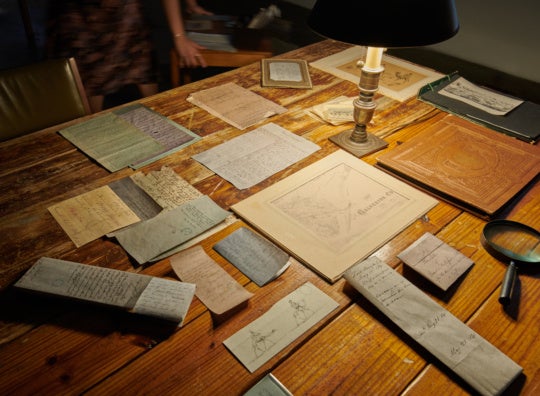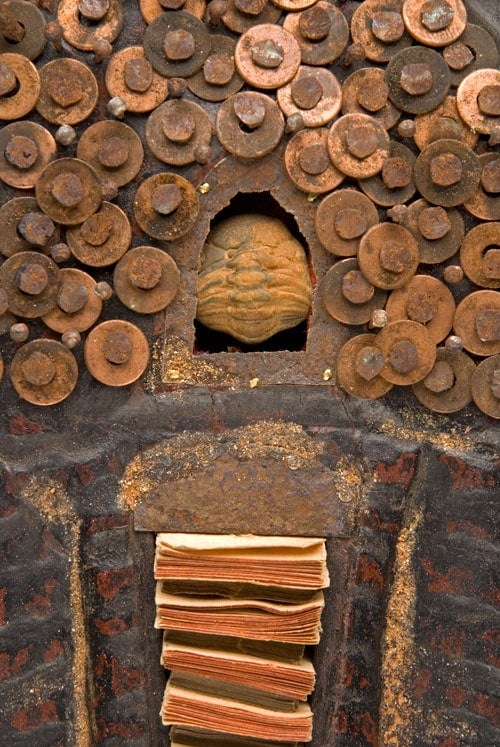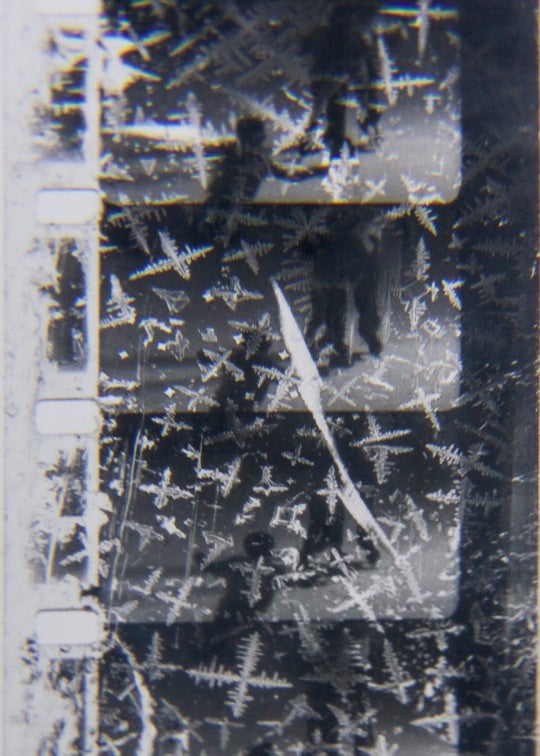[cont.]
“I sense a good bit of anger here,” the counselor leaned forward, a little anxious.
Maggie laughed lightly and the counselor relaxed and leaned back. “You’re probably right about that.”
“Maggie, darling, you never get angry, so I have to think that I’ve hit a nerve here. Even you recognize that there’s some truth in my comments. And you should realize that you’re not the only one with an abusive, domineering father. My dad yelled at me all the time too. It hurts me that you think I’m like that. I’m really not trying to control you. I frankly don’t think you’re using all the gifts you have. I think you are better than your expectations for yourself. You shouldn’t be afraid of being more. If I’ve been prodding too hard, though, it’s only because I love you so much.”
Maggie reached over and squeezed her hand. It seemed like the right thing to do.
“Well, our time has come to an end. I want to assign a task to both of you to write a list of what you like and don’t like about each other. That will allow us to proceed from a calmer place next time. And Maggie, if you don’t want to share your childhood, I’ll accept that. It might help you to write about it. Holding things inside is counterproductive. Madison, spend this week practicing your listening skills. I’ll see you both at the same time next week.”
Maggie and Madison walked together down the wide tiled hallway to the front door. Madison stepped back so Maggie would open the door for her. They kissed perfunctorily outside and separated. Madison was parked right in front of the doorway. Maggie walked to the far end of the parking lot where the ficus trees cast a bit of shade on the Volvo Dennis had given her. It had 127,000 miles on it and she intended to drive it until it completely fell apart. Dennis had told her when he surprised her with the keys, “This is the safest car on the roads today, munchkin. You drive it safely now.” The salt from New York highways had rusted the wheel wells a bit but she treasured it.
Edging her way through the thicket of vehicles on the 405, she thought about the counselor’s suggestion to write about her childhood. She wasn’t much interested in the past, an odd realization for someone about to study art history. It was the evolution of beauty that interested her, the elasticity of ideas. The evolution of balancing order and chaos, balancing life force and death wish, reason and lust. All of the arts were like the fable of Vishnu and the Boar – “I have rescued you this way forever,” a recurring interaction between the cosmic forces of creation and destruction, rendered intimate on a human scale. Illuminating meaning, the goal of all art, was ultimately the effort to reconcile these two primal forces, to force a meaningful truce. Only in myths and art is it possible for creation to balance destruction.
Inside her tiny little bungalow in Culver City, she placed her keys in the ceramic bowl by the door and kicked off her shoes, thankful that she’d had the good sense to resist Madison’s insistence on moving in together. She walked past the pale peach colored couch, over to the broom closet to pull out the orange mat and placed it carefully in front of the small faceless stone Buddha sitting on tangerine crate inside the fireplace. She sat cross legged in front of it, lingering over each fold and chip in the stone with her eyes, and willed herself to emptiness. She kept repeating: Time has no meaning here. Time has no meaning here. Over and over until everything was still and suffused with a warm light emanating from emptiness. In one of her conversations with Teresa, she’d mentioned this state. Teresa had told her that as she painted, she too felt as if she existed outside the space/time continuum. In Medieval Europe, the faithful believed that time held still and they did not age as they recited their paternosters and Hail Marys. Fingering the rosary beads one by one by one literally transported them outside of the grips of time. Art, Teresa said, was a kind of prayer, a way to center oneself and feel everything and nothing, to move beyond desire by being desire.
Desire is such a potent part of life, a disease really. It’s no wonder that every major religion has tried to tame it. Madison, as part of her post-coital monologues, would stroke Maggie’s hair murmuring, “the heart wants what the heart wants.” But it wasn’t about the heart, about feelings really. It was desire devouring its way toward sated. Desire, like any other virus, just wanted to eat and replicate and would contort to find another venue, another fresh feeding ground. Barbara had a new “roommate.” Madison would find a replacement for her at least as quickly. “One true love” might exist, just not in Maggie’s universe. That’s not true. Odessa and Dennis had true love, a strong and healthy partnership. She remembered those evenings when Dennis would come back from the clinic with his shoulders hunched up and his head down. Patients died all the time because theirs was pretty much the clinic of last resort, and when one he had grown close to died, he always felt it was his fault. Odessa would sit him down, take off his shoes and tie, and massage his shoulders. The look he gave her, both grateful and tender, that look was what Maggie wanted in her life.
The night after she was told about the car accident which had killed her father and five of her brothers, she did not cry. She stretched out on the cot in the dormitory, her duffle bag packed and ready for the first bus home, staring at the pattern of lights on the ceiling cast through the sparse trees outside her window. She stared at them for what felt like hours, everything shifting ever so slightly with every tiny little breeze, and out of the staring came a voice, a deep voice, not exactly male or female, so rich and reassuring. This voice assured her that her core was a vacuum, held in place by layers, one layer for each year of humanity. When she died, the layers would crack, the vacuum would be released and balance would be restored. It was the first and only vision she had ever had and it never failed to calm her every time she remembered it.
Maybe her lovers recognized this void at her center and merely saw themselves, their desires, their goals reflected on those nicely polished layers. When she had suggested this to Odessa, Odessa had touched her shoulder, “We all feel that way at times, my dear girl. We all feel like frauds and charlatans and see ourselves as vacuous and empty at times. You aren’t alone in this. Just remember it’s our basic nature to see what we want to see. No one, no one is exempt.”
Even someone who had experienced a genuine relationship could be fooled by the shiny layers. What did Odessa see in Larry? What she wanted to see or what he was? Odessa’s involvement with him puzzled her. Actually, it baffled her. After the steady love she shared with Dennis, why would she mess around with such a notorious philanderer? Yes, he was good with her – for now. He did all the textbook wooing activities like bringing flowers and moonlit walks on the beach and expensive dinners and thoughtful gifts. And he was always soliciting her advice on his art purchases, bringing in his friends to buy from the gallery, reading excerpts from his novel-in-progress to her, using her suggestions, dedicating the novel to her. Maggie could see how all of this would appeal to Odessa’s vanity. But his pattern was clear and long. Odessa couldn’t possibly expect the outcome to be different for her. He really was the kind of man she used to despise. What was she doing with him?
If Odessa could get sucked into such a wrong relationship, what chance did she have?
Maybe, Maggie thought as she swept her tile floor, the counselor was right: she should try writing on a regular basis and just let it all come out uncensored. Revel in a rush of language, converting all these hours into something tangible in the outside world. Maybe the answers were simply hidden in an excess of language. And writing, like everything else, improved with practice. It would help strengthen her skills for her thesis. Maybe she could make more sense of the world by pinning it down on paper, allowing herself the opportunity to excavate the pages for glimpses of meaning and patterns to erase. Trapping those and pinning those down. Her life as a butterfly collection.
Forty Two
Lisa stretched across the lounge on the stone porch sipping her glass of Pinot grigio, staring off at the haze of the ocean deepening into sunset. She could hear her two children downstairs, their designated playground since there was no real yard here. Her mother’s beautiful cactus garden in front of the house was certainly not a yard. Behind the house was a cliff too steep for anyone’s use. Now that she had ripped out all the horrible abrasive carpet the architect had insisted upon, replacing it downstairs with a gigantic yoga pad, it was safe for play. Her sweet mother felt compelled to accede to his wishes, even after Lisa scraped knees and elbows on its coarse surface; she, however, did not feel the same obligation. Her children would inevitably damage themselves; it’s part of growing up. However, they would not suffer the same injuries she had. Lisa was quite intent on that.




